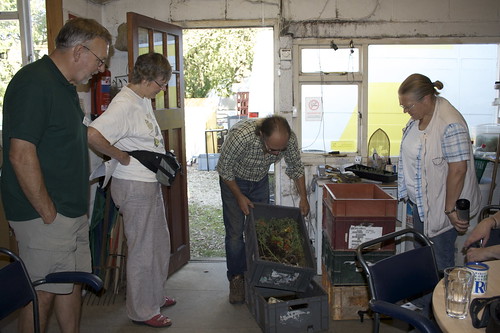 a>
Dedicated Oxfordshire Master Composters examining a homemade worm compost bin
a>
Dedicated Oxfordshire Master Composters examining a homemade worm compost bin
As part of International Compost Awareness Week, Oxfordshire County Council is encouraging more residents to get composting with a fantastic offer promoted in partnership with getcomposting.com. Residents can purchase discounted compost converters from as little as £17.98 (down from £19.98 last year) and a second compost converter from only £8.99 (RRP £39), a massive saving! (A one-off delivery charge of £5.99 applies.)
More than 30% of the average household waste can be composted, and home composting is a great way to reduce the amount of organic kitchen waste that goes into your household bin. It’s also a cheaper alternative to chargeable garden waste collections and has the added benefit of producing a FREE supply of top quality compost that will not only improve the quality of home grown fruit and vegetables but also increase their yield.
And to get you in the composting mood, we have some top composting tips from Oxfordshire Master Composters:
- I "cook" my compost, to sterilise it and kill off any hardy weed seeds. I stick it in the oven for 10 minutes, or nuke it in the microwave - MC Ailsa Barber.
- My favourite tip is saving up coffee grounds from my cafetiere mixed with water in an old plastic bottle and, when full, poured into the composter – MC Angela Hoy.
- Most people know that leaf mould can take a long time to rot down as do shredded prunings. The process can be speeded up by mixing them both with lawn cuttings which, during the summer can be too much to add to a compost bin. I keep leaves and shreddings in a brick enclosure and then add the grass to the top of the heap and fork it in - you end up with a large heap of a black crumbly mix heaving with worms which is the basis of my tomato trench – MC Colin Fox.
- Remember that compost is much better on the garden than stored in a compost bin, so start using it and make space for the new season’s contributions – MC Lynda Smith.